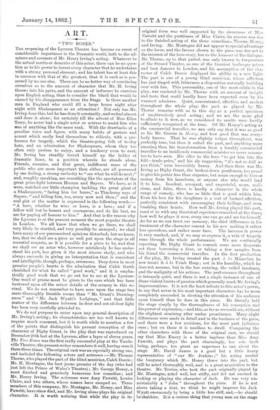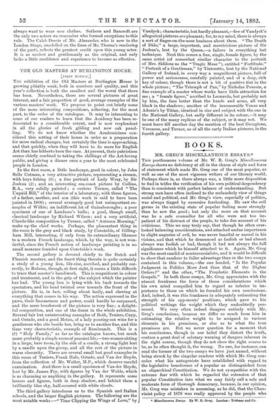ART.
"TWO ROSES."
THE reopening of the Lyceum Theatre has become an event of considerable importance in the Dramatic world, both to the ad- mirers and scorners of Mr. Henry Irving's acting. Whatever be the actual merits or demerits of this actor, there can be no ques- tion as to his power to invest every character that he undertakes with a strong personal element ; and his talent has at least this in common with that of the greatest, that it is such as is pos- sessed by no one else. There can be no better way of convincing ourselves as to the amount of character that Mr. H. Irving throws into his parts, and the amount of influence he exercises upon English acting, than to consider the blank that would be caused by his disappearance from the Stage. Is there another man in England who could fill a large house night after night with Shakespeare as an attraction ? Not only has Mr. Irving done this, but he has done it constantly, and we had almost said done it alone ; for certainly till the advent of Miss Ellen Terry, he never had a single actor or actress to assist him who was of anything like the same rank. With the drawbacks of a peculiar voice and figure, with many habits of gesture and accent which easily lend themselves to ridicule, with a pre- ference for tragedy, which the theatre-going folk of to-day hate, and an admiration for Shakespeare, whom they too often only profess to enjoy, and a tendency even to rant, Mr. Irving has steadily forced himself up the ladder of dramatic fame, to a position wherein he stands alone. Friends, enemies, and that great, indifferent mass of the public who are more important than either, are all possessed by one feeling, a strong curiosity to " see what he will do next ;" and, roughly speaking, are something like the spectators of the great prize-fight between Heenan and Sayers. We have, as it were, watched our little champion tackling the great giant of a Shakespeare, " facing him for hours," as Thackeray says of Sayers, " and felling him, too, every now and then ;" and the real gist of the matter is expressed in the following words A hero, whether he wins or loses, is a hero ; and if a fellow will but be honest and courageous, and do his best, we are for paying all honour to him." And that is the reason why the Lyceum is at the present moment the most popular theatre in London. We all know that when we go there, we shall very likely be startled, and very possibly be annoyed ; we shall have many of our preconceived opinions disturbed; but we know, too, that we shall see a piece as well put upon the stage in all essential respects, as it is possible for a piece to be, and that we shall see an actor who, however mistakenly he has under- stood his part, has given it the most sincere study, and who always succeeds in giving an interpretation that is consistent and intelligible, though, perhaps, erroneous. Deep down in most genuine people's hearts is the admiration that Caleb Garth cherished for what he called " good work," and it is empha- tically good work that we go out for to see at the Lyceum. One word of praise must be given to the care which has been bestowed upon all the minor details of the scenery in this re-
vival. We do not remember to have seen upon the stage two more thoroughly liveable rooms than " Mr. Grant's Drawing- room " and " Mr. Jack Wyatt's Lodgings, " and that little matter of the difference between in-door and out-of-door light has been very carefully attended to.
We do not purpose to enter upon any general description of Mr. Irving's acting ; its characteristics are too well known to require much comment, but it is worth while to mention a few of the points that distinguish his present conception of the character of Digby Grant, in the play that was reproduced on December 26th last at the Lyceum, after a lapse of eleven years. The Two Roses was the first really successful play at the Vaude- ville Theatre ; the present writer remembers it well, having seen it there three times. The original cast was an especially strong one, and included the following actors and actresses :—Mr. Thomas Thorne, who played the part of the blind musician, Caleb Deecie ; Mr. H. Montagne, the best jenne premier of the day (who had just left the Prince of Wales's Theatre) ; Mr. George Honey, a most finished and genuinely humorous low comedian ; and Mr. Henry Irving. The actresses were Amy Fawsitt, Louise Claire, and two others, whose names have escaped us. Three members of this company, Mr. Montagne, Mr. Honey, and Miss Faweitt, have since died, and Mr. Irving alone plays his original character. It is worth noticing that while the play in its
original form was well supported by the cleverness of Miss Fawsitt and the prettiness of Miss Claire, its success was due to the finished acting of the three comedians, Thorne, Honey, and Irving. Mr. Montague did not appear to special advantage as the lover, and the favour shown to the piece was due not to the interest of the love-story, but to the humour of the dialogue. Mr. Thorne, up to that period, was only known to frequenters of the Strand Theatre, as one of the funniest burlesque actors and best dancers in London, and his assumption of the cha- racter of Caleb Deecie displayed his ability iu a new light. The part is one of a young blind musician, whose affliction has just tinged with bitterness a disposition naturally bubbling over with fun. This personality, one of the most subtle in the play, was rendered by Mr. Thorne with an amount of insight and taste that could hardly have been expected even by his warmest admirers. Quiet, concentrated, effective, and modest throughout the whole play, the part as played by Mr. Thorne remains with us to this day as a perfect specimen of unobtrusively good acting ; and we are the more glad to allude to it now, as we considered its merits were hardly sufficiently recognised at the time. Of Mr. Honey's acting as the commercial traveller, we can only say that it was as good as his Mr. Graves in Money, and how good that was every- body knows. That he was slightly vulgar throughout, was perfectly true, but then it suited the part, and anything more amusing than his transformation from a frankly commercial traveller to an insidiously commercial minister we never remem- ber to have seen. His offer to the hero " to get him into the fold—trade price," and his sly suggestion, "it's not so dull as you think," were irresistibly funny. And then there was Mr. Irving as Digby Grant, the broken-down gentleman, too proud to give his porter less than sixpence, but mean enough to borrow money from his laundress, or anyone else who would lend it to him. Insolent, arrogant, and ungrateful, mean, mali- cious, and false, there is hardly a character in the whole range of comedy, who has so little that is good within him. Even his love for his daughters is a sort of bastard affection, perfectly consistent with encouraging their failings, and even breaking their hearts. How well Mr. Irving played this part, most of us with any theatrical experience remarked at the time ; how well he plays it now, every one can go and see for himself. As far as we can trust our memory, the chief differences in his treatment of the character consist in his now making it rather less querulous, and rather more base. The increase in power is very marked, and, if we may so express it, a vein of tragedy runs through the whole performance. We are continually expecting Mr. Digby Grant to commit some more desperate act than borrowing a fiver, or taking a few samples from his friend the commercial traveller. In the first production of the play, Mr. Irving treated the part a la Micawber, he now treats it a. la Uriah Heep ; not in the humility, which lie does not assume, but in the low cunning, the veiled insolence, and the malignity of his actions. The performance throughout is intensely quiet, and there is not a single instance of one of those violent bursts of passion which generally mark Mr. Irving's impersonations. It is not the least tribute to this actor's power, to say that never in his most important characters has he more completely succeeded in riveting the attention of his audience upon himself than he does in this piece. He literally held the stage simply by the thoroughness of his conception and his power of expression,—and this, as far as we could see, without the slightest straining after undue prominence. Many slight differences were made in detail and in the business of the piece, and there were a few excisions, for the most part judicious ones ; but on these it is needless to dwell. Comparing the other characters with those of the original cast, we should say that Miss Emery is a better ingenue than Miss Amy Fawsitt, and plays the part charmingly, her sole fault being, perhaps, too great an eagerness to run about the stage. Mr. David James is a good but a little heavy representative of " our Mr. Jenkins ;" his acting needed the buoyancy which Mr. Honey threw into the part, but still he acted thoroughly well, and is a great acquisition to the theatre. Mr. Terries, who took the part originally played by Mr. Montagne, acted well, but stiffly, and did not succeed in looking or playing the character of Jack. He was very un- mistakably a " John " throughout the piece. If be is not above taking a hint, we think he might improve his Jack Wyatt enormously by being a little less stiff, and,—he should be shabbier. It is a curious thing that young men on the stage
always want to wear new clothes. Sothern and Bancroft are the only two actors we remember who formed exceptions to this rule. The Caleb Deecie of Mr. Alexander, who is new to the London Stage, (modelled on the lines of Mr. Thorne's rendering of the part), reflects the greatest credit upon this young actor. It is as modest and gentlemanly as the original, and only lacks a little confidence and experience to become as effective.







































 Previous page
Previous page